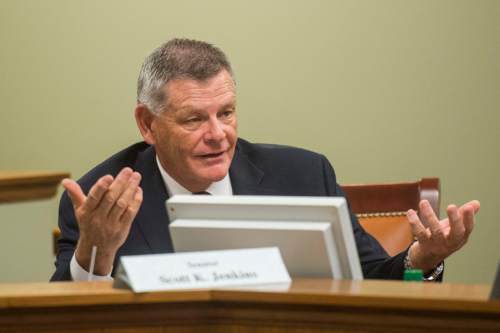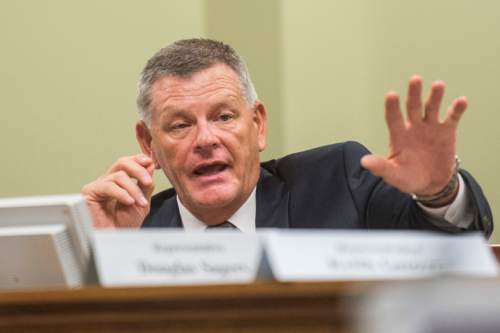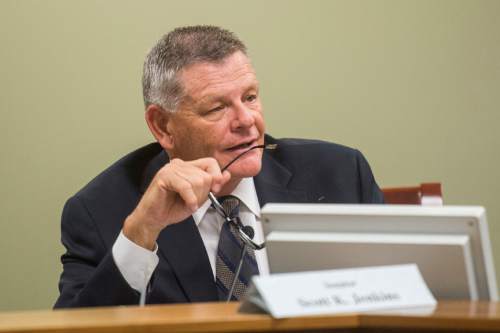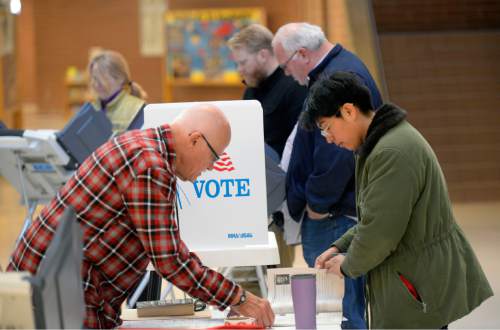This is an archived article that was published on sltrib.com in 2015, and information in the article may be outdated. It is provided only for personal research purposes and may not be reprinted.
State Sen. Scott Jenkins is firing the first shot in a legislative battle that may dilute or overturn a new law that changes how parties select their nominees.
Jenkins unveiled a bill, SB43, to erase a new requirement for parties appearing on the ballot to allow independent voters to participate in their primary elections. Democrats have allowed that for years, but the Utah GOP, beginning in 2002, closed its primaries to everyone except registered Republicans.
It's a big deal because 43.6 percent of Utah voters are now unaffiliated, compared to 45.5 percent who are registered as Republicans and 9.4 percent registered as Democrats. If the nearly half of Utahns who are independents can't vote in primaries, they have no say about who appears on the general-election ballot.
Jenkins' bill could affect the 2016 re-election campaign of, among others, conservative U.S. Sen. Mike Lee — who may have an easier time securing the GOP nomination if only Republicans vote, than if independents participate.
A recent Brigham Young University poll showed Lee with 70 percent support among Republicans, but a bare majority among all voters. It said 45 percent of all Utah voters had an unfavorable view of the senator.
But the new law, which officially took effect Thursday , also creates a system where perhaps three or more people could appear on the primary ballot instead of the traditional two. That could help Lee, who has a solid base with conservatives, as opponents split the vote against him.
The requirement about unaffiliated voters was part of a compromise bill, SB54, passed in the last legislative session to stop the Count My Vote initiative from appearing on the ballot. When the bill passed, initiative supporters dropped their petition drive.
Other parts of the compromise allow candidates to circumvent party conventions and appear on the primary ballot if they gather enough signatures, which the Count My Vote initiative had sought.
But the compromise preserves the older option of qualifying for the primary through party conventions. In the past, candidates who won 60 percent or more of delegate votes proceeded directly to the general election. Otherwise, the top two faced off in a primary.
The Republican Party has sued to overturn the new law, saying it infringes on its constitutional right of assembly and its power to select nominees as it chooses.
Jenkins, R-Plain City, said he is also seeking to overturn the compromise through legislation. His new SB43 is a first shot, and he also plans to sponsor a constitutional amendment that could overturn the compromise entirely.
He said allowing only Republicans to vote in a GOP primary "is very fundamental." He also says the traditional caucus-convention system allowed candidates with little money to campaign directly with a small number of delegates.
Count My Vote efforts to circumvent that system are "about the wealthy elite of the state trying to control the vote" in primaries where much money is needed, Jenkins said.
Changing the system "was all about taking Senator Lee out," Jenkins said, and "trying to take the conservative base of the party out of the playing field."
Jenkins said he is not specifically trying to help Lee, but simply trying to let parties control their own nominating process.
James Evans, chairman of the Utah Republican Party, said he questions why Count My Vote insisted that the new law take effect for the 2016 election, which he said presents a difficult timetable for his party to change procedures.
"A push for 2016 does raise the concern about whether there is some other agenda," he said when asked about its effect on Lee's chances.
Rich McKeown, executive co-chairman of Count My Vote, dismissed concerns about the timing. "We commenced this effort in 2009," a year before Lee was elected. "Count My Vote was about participation, not outcome. We have simply tried to create a system that will enhance the number of people who participate in the electoral process."
Headed by such people as former Gov. Mike Leavitt, Count My Vote contends extremists sometimes controlled party conventions. It said the system contributed to low voter turnout by eliminating many primaries and fielding candidates outside the mainstream.
"We have literally watched the number of participants in our elections topple from the top five in the country to bottom five or 10 consistently," McKeown said.
The compromise was approved by Republican majorities in the House and Senate, and was signed by GOP Gov. Gary Herbert, he noted. "We ought to give this a try before we begin to tinker with it."
Kirk Jowers, a founder of Count My Vote who is director of the Hinckley Institute of Politics at the University of Utah, agrees.
"It is a mistake to try to tinker with it before we have a chance to see how it works. We've had the convention-caucus system for well over 100 years. We should give this reform at least two to three election cycles," he said.
Jowers said the GOP lawsuit challenging the bill and legislative moves to dilute or revoke it "are making it that much more difficult for candidates and election officials to prepare" for the 2016 election. "The system needs certainty."
But Evans said that is what the Republican Party is seeking through its lawsuit. "It would give us some clarity." Without it, he said, "We'll be in this perpetual cycle of trying to decide how we select our candidates."









